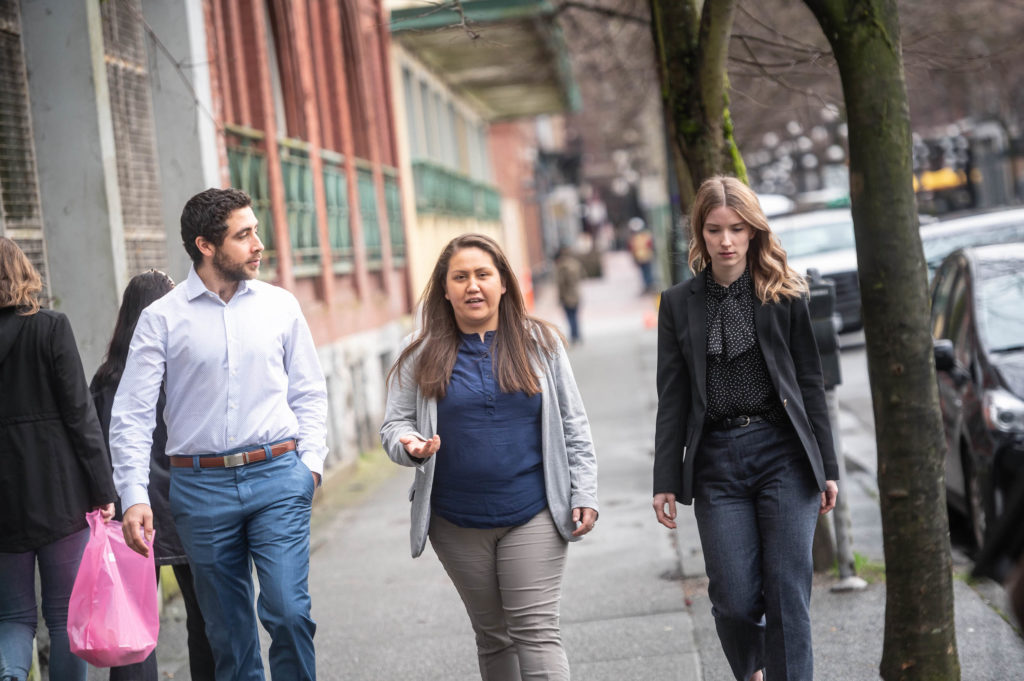UBC law students take extraordinary steps to continue pro bono legal work during outbreak
COVID-19 threatened to end the most valuable work experience 10 law students have ever had.
The students from the Peter A. Allard School of Law at UBC had spent more than two months from January to March doing legal work for clients at the Indigenous Community Legal Clinic in Vancouver’s Downtown Eastside, gaining practical experience while helping people navigate the legal system.
When the virus hit, closing up shop and calling it a semester would have been the easy thing to do. But the right thing isn’t always the easy thing.
“The legal issues our clients are facing don’t go away just because there’s this new problem of a pandemic on the horizon,” said Trudy Smith, a second-year law student. “A lot of these processes will resolve more quickly than they would have if we had closed completely, which is important because they have significant consequences in our clients’ lives.”
The Alexander Street clinic provides free legal services for Indigenous people in B.C., including criminal law, family law, civil rights law, labour and employment law, and aboriginal law. It also gives students an invaluable opportunity to learn lawyering skills in a supervised setting, complementing their classroom studies.

UBC law students were able to take breaks together early in the term, but have had to stay connected online ever since social distancing became the norm. Credit: Paul Joseph/UBC
Since a public health emergency was declared in mid-March, the students, supervising lawyers and staff have adapted to a challenge that is unprecedented in the clinic’s 26 years of operation. They had approximately 150 files open at the time. The students scanned their documents to a secure online platform and set up systems to connect with clients and each other by phone, email and Zoom. Then they packed up their office supplies and went to work—at home.
FEATURE STORY: Indigenous Community Legal Clinic creates change, one file and one student at a time
Even though the courts have been hearing only urgent matters, the students have still had plenty to do. For example, some have prepared settlement applications for clients in the Federal Indian Day School class-action lawsuit. Smith has been helping a client probate a parent’s will, and tracking down adoption records for another.
The social issues prevalent in the Downtown Eastside mean many of the clinic’s clients are disproportionately impacted by the outbreak. The move to remote service was undoubtedly a relief for those clients with health issues, but it also compromised the human connections that are a hallmark of the clinic’s work. Students have been doing their best to offer emotional support over the phone, and through digital platforms that can’t quite replace face-to-face interaction.
“We received a significant amount of training at the beginning of the semester about how to work with clients who have experienced trauma of all types, as this is the common experience of those we serve at the clinic,” said second-year student Kiera Stel. “Cutting off our working relationships with clients would have gone against all the trauma-informed legal practice techniques that we learned about.”
Smith and Stel recently completed their terms, and a new cohort of students is continuing service into the summer. They have undergone orientation and are about to transition to working directly with clients.
“Two amazing cohorts of students at the Indigenous Community Legal Clinic are continuing to provide excellent legal services to our clients in this difficult time,” said Patricia Barkaskas, the clinic’s academic director. “It is really the students who have made this clinic what it is. It’s their late nights, their anxious tears. It’s all their hard work for the clients that is changing the way Indigenous peoples are being represented in law and legal contexts, with every file that we open.”
The Indigenous Community Legal Clinic is an experiential learning program at the Allard School of Law that exists thanks to the generous support of its many donors, including the Law Foundation of British Columbia, and community supporters.

